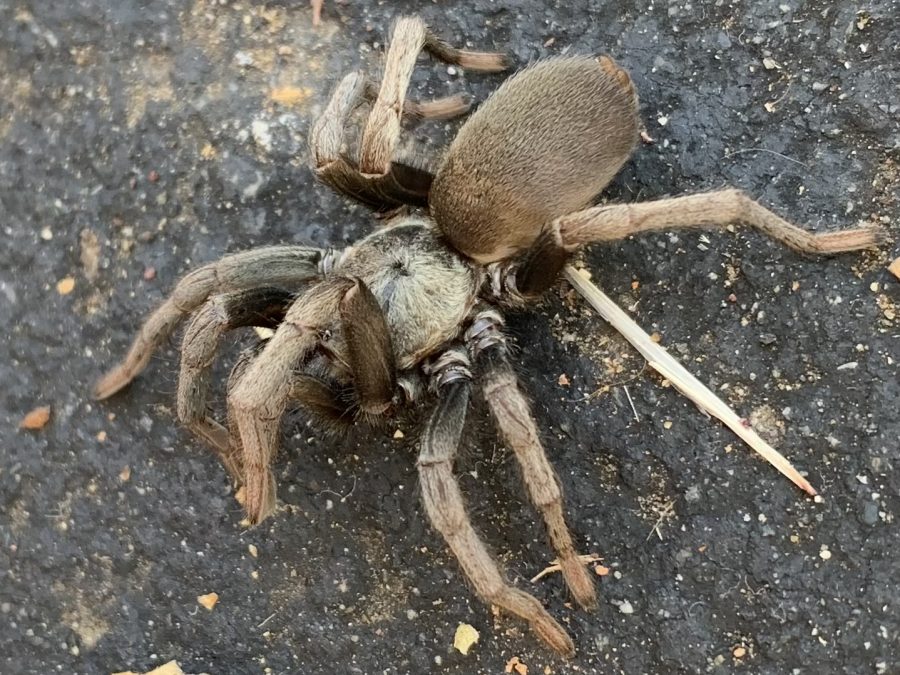Within the past few weeks, the local tarantula species dubbed the Bay Area blond has returned to the trails of Belmont and San Carlos for its mating season.
Tarantula mating season begins in early fall when the ordinarily nocturnal eight-legged creatures brave the daylight in search of a mate. According to the East Bay Regional Park District, humans are most likely to spot tarantulas during this time, as the tarantula’s search for a mate can cover distances of up to three-quarters of a mile. These blond tarantulas can be seen seasonally throughout the Bay Area, and Carlmont is no exception.
Grant Steunenberg, one of Carlmont’s administrative vice principals, had a run-in with one of these animals late last week, as he spotted one behind the T-wing.
“There is a turn in the road that goes by the T-wing and goes up towards the U-wing, and we call that the fire access, and [a tarantula] was walking across [the road],” Steunenberg said.
While the thought of coming across a giant spider as one is heading to school is a frightening one, it is valuable to note that tarantulas are not very harmful and pose no mortal threat to humans. According to National Geographic, a tarantula bite hurts no more than a bee sting.
Steunenberg explained the importance of leaving the tarantulas be when one comes across a tarantula, even though they seem a bit intimidating at first glance.
“I think everyone has a little bit of a fear of a spider,” Steunenberg said. “I try not to squish them, and I have to realize that they are predators and [part of the food chain], so they need to be preserved more than they need to be killed.”
Some students don’t mind the sight of a spider, like Calista Savay, who said that she enjoys seeing them around.
“I think that they’re honestly kind of cool because they’re pretty much harmless,” Savay said. “I like their features, and they have eight eyes and are furry.”
I think that they’re honestly kind of cool because they’re pretty much harmless.
— Calista Savay
According to the East Bay Regional Park District, these spiders help control various insect populations, like crickets. Their predators are the tarantula wasp, as well as other lizards and mammals. They also can be harmed by humans, with threats ranging from busy roads to a passerby’s foot.
In the East Bay Parks, there are practices that promote the protection of tarantulas and all wildlife. Anthony Fisher, a naturalist at the Tilden Nature Area, highlighted some of the protections, including educational awareness campaigns that are implemented to inform the public about tarantula behavior.
“We have a no collection policy year-round for every animal and plant,” Fisher said. “We do some tarantula programs during the season when the males are out looking for mates, so that probably helps [increase] awareness about the spiders.”
According to the Denver Post, there are concerns about the decreasing tarantula population in other areas in the United States, such as Colorado. This issue has sparked debate as to whether this decrease has to do with climate change. Kevin Dixon, a naturalist at Black Diamond Mines Regional Preserve, noted that climate change does likely affect tarantulas, especially if a habitat is no longer suited for their needs.
“Yes, they are affected by climate change, since we find particular species of tarantulas in specific climates and ecosystems to which they are particularly well-adapted, having evolved there. For example, desert tarantulas might move into areas which were previously dominated to more cool-weather adapted species,” Dixon said. “I have also long wondered whether unusual conditions such as drought might affect whether tarantulas come out at all.”
Still, so far, the Bay Area blonde tarantulas don’t have to worry about the possibility of endangerment since they are pretty common. This idea was reaffirmed by Lisa Schoichet, a volunteer with the wildlife center at the Peninsula Humane Society and SPCA.
“They’re very common. I think that if they’d gotten the endangered species list, we’d hear about it. So I think right now we don’t have to worry about it,” Schoichet said. “It certainly looks like if you look at ones from other areas, climate change could start putting [tarantulas] into an endangered category [over time], but we don’t have to worry about our population yet.”
For those interested in learning more about tarantulas, Schoichet noted that there is an upcoming Tarantula Festival in Morgan Hill, Calif., on Oct. 2.
Schoichet underscored the significance of seeing a tarantula up close as an exciting experience to have.
“It’s [enjoyable] just being able to watch a creature that you normally wouldn’t be able to watch close up,” Schoichet said.














